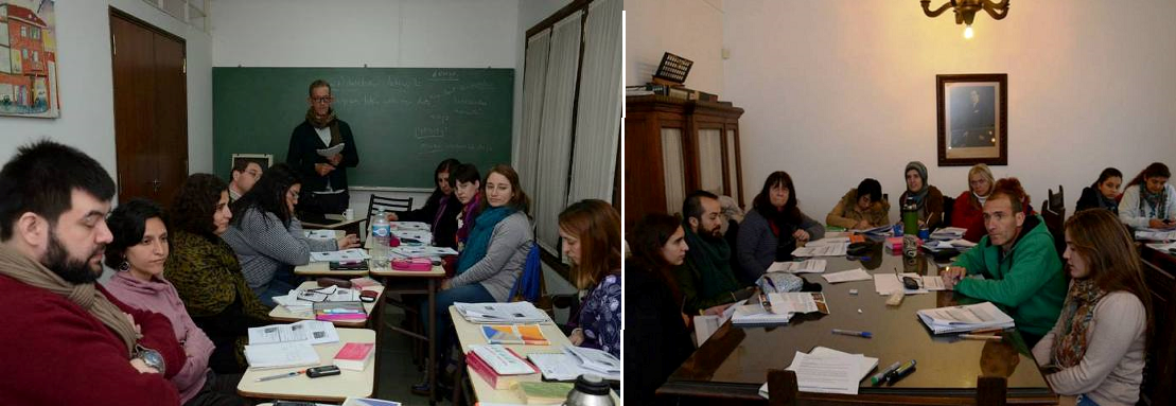basque heritage worldwide

07/22/2013

ADVERTISING
Rosario, Argentina. Continuing with the program that began in January and planned for 2013-2016, the Winter Barnetegi began in Rosario as part of the Euskara Munduan Program. The course that will run for a week gathers students from Euskal Etxeas in Argentina, Brazil, Chile, and Uruguay with the goal of working on communication skills.

[Before the activities began, authorities from FEVA welcomed students to the Barnetegi. Following, Kinku Zinkunegi gave the greeting and explained how the course was organized (photo EuskalKultura.com)]
The group of future irakasles (teachers) is being trained in part through an online course and since March has been completing weekly assignments and has been tutored by a professor in the Basque Country. The face-to-face meeting is meant as a time to review and put into practice what has been learned during the first phase. Activities began on Saturday morning after welcoming words by Ricardo Basterra, FEVA president, and Monica Gabilondo representing the local Zazpirak Bat Basque club.
Euskera and Basque Culture at the University
In regards to activities that are carried out in support of the Basque language and culture by the Rosario Basque club, it should be noted that as of the beginning of the academic year, thanks to an agreement signed between Zazpirak Bat and the University, Euskera will now be offered as one of the modern languages in the College of Humanities and Arts in Rosario. The agreement was finalized on July 5 but the official presentation took place last Saturday as part of the Barnetegi.
Led by Fernanda Fignoni, club vice-president, the ceremony began with words from President Javier Oteiza who thanked everyone present for attending and stressed the important of the joint venture between the University and the Basque club. On his behalf, the Dean of the College of Humanities and Art underscored in his speech that “this agreement is of the utmost importance because Basque is not only being included as a university language, but also its cultural heritage and the possibility of sharing it,” said Jose Goity.

[During the event Zinkunegi presented a diploma to the Basque Professor Alejo Conti. In the photo Fernando Fignoni, Jaiver Oteiza, Ricardo Basterra, Alejo Conti, Kinku Zinkunegi and Jose Goity (photo VGO)]
Next the professor in charge of the Basque language and culture chair, Alejo Conti, explained the expectations of the course. “The initiative of teaching Basque at the university level is a challenge and an opportunity; a challenge since it is a leap of quality and an opportunity because of the fact that it allows the extension of Euskera to spaces that have not yet been sufficiently exploited. In regards to methodology, classes will be taught using HABE’s and FEVA’s methods that prioritize communication strategies.”
Representing FEVA, President Ricardo Basterra, relayed not only the regards of the entire entity but as well the Federation’s complete support of the project. Finally in the name of HABE, Kinku Zinkunegi presented a certificate of completion to teacher Alejo Conti while stressing the qualitative leap that it will mean to Rosario having Basque being taught at the university. Remember that Alejo Conti was part of the Euskara Munduan Program that was certified during HABE exams that were held in Buenos Aires.
To conclude the ceremony, Fernanda Fignoni, club vice-president, read the words of local linguist Nora Mugica on Basque.
ADVERTISING
ADVERTISING
ADVERTISING
ADVERTISING
ADVERTISING
© 2014 - 2019 Basque Heritage Elkartea
Bera Bera 73
20009 Donostia / San Sebastián
Tel: (+34) 943 316170
Email: info@euskalkultura.eus